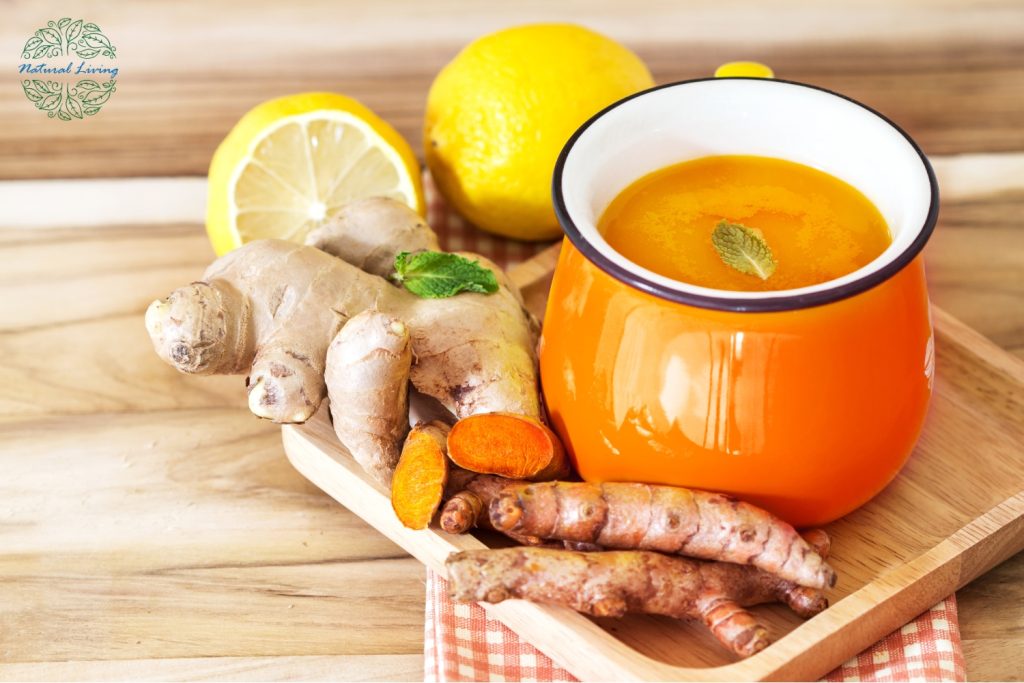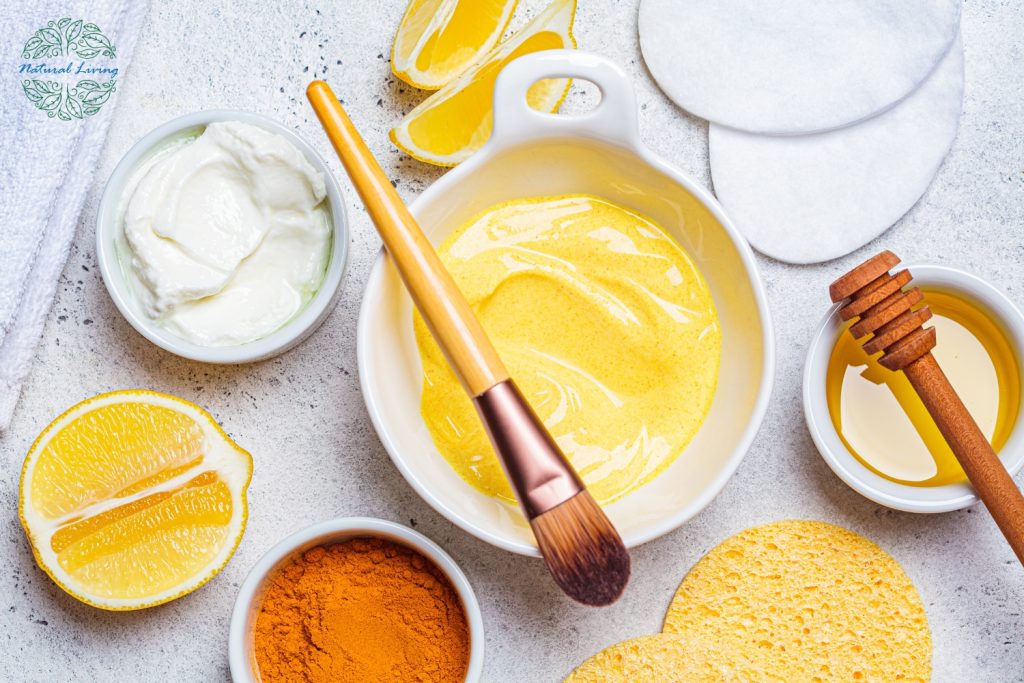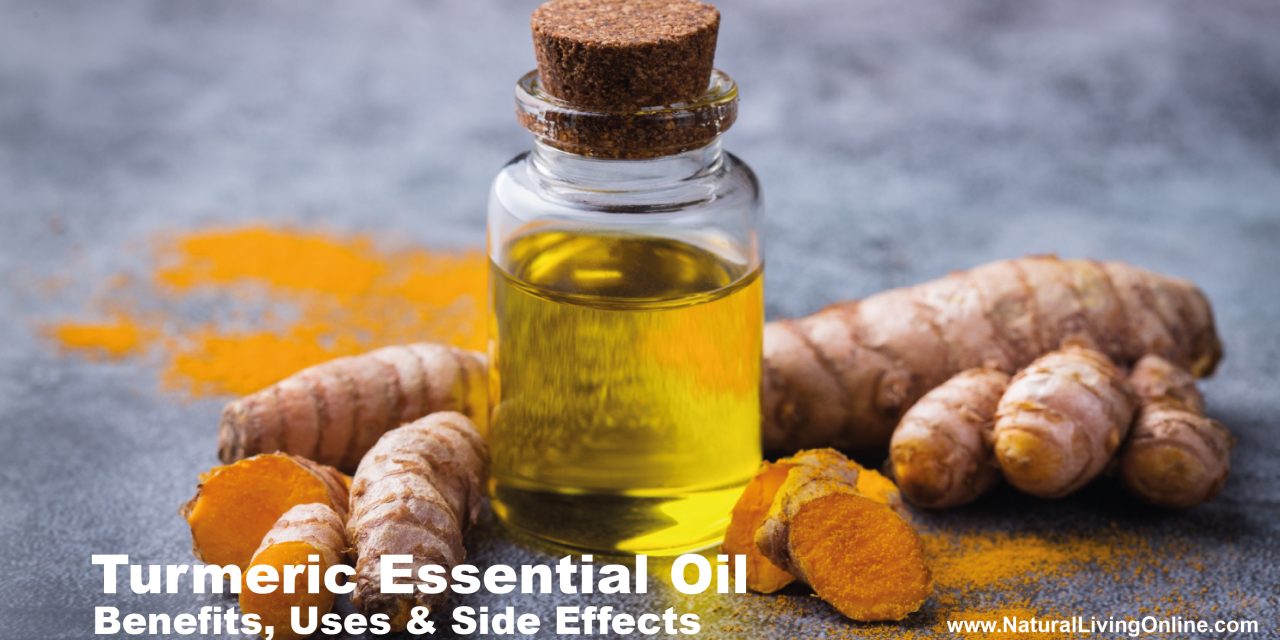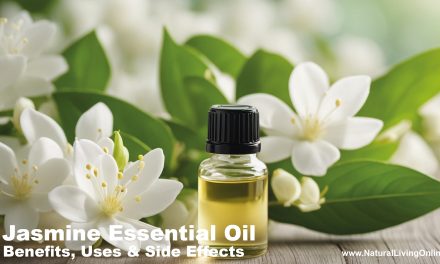Turmeric essential oil, derived from the roots of the Curcuma longa plant, carries a wealth of benefits and has been used traditionally in both Ayurvedic and Chinese medicine. The oil, which retains the bright yellow hue of the turmeric spice, is rich in antioxidants and boasts a plethora of therapeutic properties. As a concentrated extract, it encapsulates the plant’s potential to support health and wellness in a versatile and potent form.
Its uses range from being a potent anti-inflammatory agent to aiding in skin care. The oil can be integrated into daily life in a variety of ways, including aromatherapy and as an addition to culinary dishes, providing both flavor and health benefits. However, it is essential to acknowledge that turmeric essential oil also has a safety profile that should be respected. Due consideration must be given to its side effects, such as the risk of skin irritation or the potential for interference with certain medications.

Key Takeaways
- Turmeric essential oil is a concentrated source of Curcuma longa’s antioxidant properties.
- The oil has diverse therapeutic uses and can be applied in culinary and aromatic contexts.
- Awareness of the oil’s safety profile and potential side effects is crucial for responsible usage.
Essential Oil Profile
Botanical Name: Curcuma longa
Common Names: Turmeric, Indian Saffron, Curcuma
Plant Family: Zingiberaceae
Countries of Origin: India, Indonesia, China, Madagascar, Sri Lanka
Extraction Method: Steam distillation
Parts Used: Rhizomes (roots)
Essential Oil Smell: Warm, spicy, earthy, with a hint of ginger and orange
Essential Oil Color: Yellow to amber
Viscosity: Thin to medium
Perfumery Note: Base to Middle
Strength of Aroma: Medium to strong
Blends Well With
- Ginger (Zingiber officinale)
- Orange (Citrus sinensis)
- Frankincense (Boswellia carterii)
- Ylang-Ylang (Cananga odorata)
- Cedarwood (Cedrus atlantica)
- Cinnamon (Cinnamomum zeylanicum)
- Black Pepper (Piper nigrum)
Therapeutic Properties
- Anti-inflammatory
- Antioxidant
- Antimicrobial
- Analgesic
- Antifungal
- Antidepressant
- Digestive aid
- Detoxifying
- Carminative
- Hepatoprotective (liver-protecting)
Uses
- Aromatherapy: to relieve stress, reduce inflammation, and promote relaxation
- Skincare: to treat acne, eczema, and improve overall skin health
- Massage: to alleviate muscle pain and joint inflammation
- Haircare: to treat dandruff and promote a healthy scalp
- Digestive aid: to help with indigestion and bloating
- Anti-aging: as part of blends for its antioxidant properties
Contraindications
- Not recommended for use during pregnancy and breastfeeding.
- May cause skin sensitivity; perform a patch test before use.
- Should not be used by individuals with gallbladder problems or gallstones.
- Avoid using undiluted on the skin.
Side Effects
- Potential skin irritation or allergic reaction in sensitive individuals.
- Photosensitivity; avoid exposure to direct sunlight after application.
- May cause staining due to its strong yellow pigment.
Types
- Pure Turmeric Essential Oil (steam-distilled)
- Turmeric CO2 Extract (using supercritical CO2 extraction for a broader range of constituents)
Chemical Constituents
- Turmerone (30-40%): Provides anti-inflammatory and antimicrobial properties.
- Alpha-Turmerone (20-30%): Known for its antioxidant and neuroprotective effects.
- Beta-Turmerone (15-25%): Contributes to anti-inflammatory and analgesic properties.
- Ar-Turmerone (5-10%): Offers antifungal and antimicrobial benefits.
- Cineole (1-3%): Adds a fresh, camphor-like note and provides decongestant properties.
- Zingiberene (1-3%): Adds to the warm, spicy aroma and offers anti-inflammatory effects.
Turmeric essential oil is prized for its potent anti-inflammatory and antioxidant properties. It is used in aromatherapy, skincare, and medicinal applications to promote overall well-being and treat a variety of conditions, particularly those related to inflammation and oxidative stress. Its vibrant color and warm, spicy aroma make it a distinctive and valuable addition to many therapeutic and cosmetic formulations.
Composition and Properties

Turmeric essential oil is distilled from the root of the turmeric plant (Curcuma longa) and contains a multitude of chemical constituents that contribute to its potent health benefits.
Main Components
The primary active component of turmeric essential oil is curcumin, known for its anti-inflammatory and antioxidant effects. However, the oil itself is rich in compounds such as turmerone and ar-turmerone, which contribute to the oil’s aromatic profile and therapeutic potential. These components are thought to support various health functions and are used in different applications due to their strong biochemical activity.
- Curcumin: Major active ingredient with potent antioxidant properties.
- Turmerone & Ar-turmerone: Less studied than curcumin; significant for their antimicrobial and possibly neuroprotective effects.
Beneficial Properties
Turmeric essential oil exhibits a wide range of beneficial properties that can be attributed to its complex composition:
- Anti-inflammatory: Reduces inflammation, which can aid in pain relief and swelling reduction.
- Antioxidants: Scavenges free radicals, contributing to its protective effects against cellular damage.
- Antibacterial & Antifungal: Effective against various bacteria and fungi, indicating its use as a natural antiseptic.
- Antimicrobial: This attribute makes it a strong candidate for use in skin care and medicinal formulations.
The oil’s antiseptic quality also underscores its use in healing minor wounds and skin issues. Given the wealth of biologically active compounds it contains, turmeric essential oil continues to be studied for additional health applications.
Therapeutic Benefits

Turmeric essential oil is renowned for its multifaceted therapeutic benefits, including its ability to alleviate inflammation and pain, support mental health, and exhibit anti-cancer properties.
Anti-Inflammatory and Pain Relief
Turmeric essential oil may significantly benefit individuals suffering from inflammatory conditions such as arthritis. The oil’s potent anti-inflammatory properties can help to reduce inflammation and offer pain relief. Research suggests that the main compound in turmeric, known as curcumin, is responsible for these effects.
Mental and Emotional Well-being
This essential oil also supports mental and emotional well-being, offering potential benefits for those with depression and anxiety. Its effects may extend to neuroprotective attributes that can be pertinent for dementia and Alzheimer’s disease. Ongoing studies explore how turmeric can influence neurotransmitter function and promote brain health.
Cancer Fighting Potential
Turmeric is reported to have anti-cancer properties that may affect cancer cells. While clinical evidence is evolving, some research indicates that turmeric essential oil could play a role in combating various cancer types by targeting and inhibiting the growth of these cells.
Culinary and Aromatic Uses
Turmeric essential oil, derived from the root of the plant in the Zingiberaceae family, is not only treasured for its health benefits but also for its culinary and aromatic applications. This versatile oil adds an aromatic depth to dishes and creates an inviting atmosphere when used in aromatherapy.
Cooking Applications
In the kitchen, chefs and home cooks alike can use turmeric essential oil for its warm, spicy flavor that is reminiscent of turmeric powder, yet more concentrated. A few drops of the oil can be incorporated into a dish to impart the characteristic taste of turmeric, known for its usage in curries and South Asian cuisine. When mixing with food, make sure to dilute the potent essential oil with a carrier oil, such as coconut oil, to ensure the flavor is well balanced and not overpowering.
Safety Tip: Remember, a little goes a long way due to its concentrated nature.
Aromatherapy and Fragrance
For aromatherapy, turmeric oil is celebrated for its warm and comforting fragrance that may help to uplift the mood when diffused. Utilizing a diffuser, one can release the essence of turmeric essential oil into the air, allowing its earthy and slightly gingery aroma to fill the room. This practice not only enhances the ambience but is also used by many seeking to harness the oil’s purported benefits for anxiety and stress relief. When blending turmeric essential oil in aromatherapy, it may be paired with other oils to create a more complex scent profile.
Safety Profile and Side Effects
Turmeric essential oil is generally considered safe when used in moderation, but it’s important to be aware of its potential side effects and toxicities. Individuals with specific health conditions or those who are pregnant or nursing should exercise caution.
Toxicity and Contraindications
Turmeric essential oil has a low level of toxicity and is largely safe for most individuals when used appropriately. However, there are contraindications to be aware of. For example, it may act as a blood thinner and could increase the risk of bleeding, particularly in individuals with bleeding disorders or those taking anticoagulant medications. Moreover, turmeric oil may exacerbate issues in persons with ulcerative colitis due to its stimulant nature on the gallbladder.
- Pregnancy: It should be used with caution as the effects on pregnancy are not fully understood.
- Nursing: Only minimal data exist on its safety during lactation; therefore, nursing mothers should consult healthcare providers before use.
- Pre-existing conditions: Individuals with gallstones or bile duct obstruction should avoid turmeric oil as it may worsen these conditions.
Recommended Dosages
Following recommended dosages is crucial for safety and effectiveness. There isn’t a universally agreed-upon dosage for turmeric essential oil, but a widely accepted guideline is a few drops to be used topically or diffused. It is of utmost importance to dilute the oil in a carrier oil when applying it to the skin to avoid irritation or allergic reactions. Oral ingestion should only be done under the guidance of a qualified professional due to the risk of complications.
- Topical use: Dilute with a carrier oil; typically, 1 to 2 drops of turmeric oil with about a tablespoon of carrier oil.
- Diffusion: 3 to 4 drops in a diffuser filled with water.
Start with the lowest possible dose and observe for any adverse reactions. Always consult with a healthcare professional for tailored advice, particularly for long-term use or when treating specific health conditions.
Integrating into Daily Life
Turmeric essential oil can be easily incorporated into daily routines for potential health and wellness benefits. It offers a versatile application, from enhancing one’s skincare regimen to being consumed in teas and supplements for overall well-being.
Skincare and Beauty
Turmeric essential oil is esteemed for its potential skin health benefits, particularly in addressing acne and other skin conditions. To leverage these benefits, one might mix a few drops with a carrier oil and apply it to the skin, targeting areas afflicted with acne or psoriasis. The oil’s anti-inflammatory properties may soothe irritation and reduce redness.
- DIY Face Mask: Add 1-2 drops of turmeric essential oil to a homemade face mask to enhance its skin benefits.
- Spot Treatment: Diluting turmeric essential oil with jojoba oil and applying directly to acne spots may aid in reduction.
Supplements and Teas
Turmeric supplements are convenient for daily intake, contributing to detoxification processes and supporting the immune system. They often come in the form of capsules or tablets and should be taken according to the manufacturer’s directions.
For those who prefer a warm beverage, turmeric tea can be a soothing way to incorporate the oil into one’s diet. The tea is commonly attributed to the promotion of digestive health.
- Capsule Form: Turmeric supplements in capsules might be used for their potential to support immune function.
- Tea Routine: Adding a drop of turmeric essential oil to a cup of tea could provide detoxifying effects.
Household and Lifestyle
Turmeric essential oil can also enhance lifestyle and household environments, contributing to a sense of well-being.
- Aromatherapy: Diffusing turmeric essential oil may elevate the ambiance of a home space and offer an emotionally uplifting atmosphere.
- Cleaning Agent: Its antimicrobial properties can be utilized by adding it to homemade natural cleaning formulas.
When integrating turmeric essential oil into daily life, remember that quality varies among products. Consumers should look for pure, high-grade essential oils and be mindful of any possible side effects, such as skin irritation or allergic reactions, especially if they’re new to using the oil.
Holistic and Traditional Perspectives

In examining the role of turmeric essential oil, one cannot overlook its significant history within holistic and traditional medicine spheres, particularly its roots in Ayurveda and connections to traditional Chinese medicine.
Ayurveda and Traditional Medicine
Ayurveda, an ancient medical system originating from India, has long valued turmeric, often referred to as the “golden spice.” Ayurvedic practitioners have traditionally used turmeric for its purported ability to balance the three doshas—Vata, Pitta, and Kapha. The essential oil of turmeric, distilled from the root of the plant, which is related to ginger, is said to possess a variety of therapeutic properties.
The utilization of turmeric essential oil in Ayurvedic medicine is extensive; it is administered to enhance digestion, support the respiratory system, and to promote clear skin. Turmeric’s active compound, curcumin, is credited with much of the oil’s benefits, including its anti-inflammatory and antioxidant effects.
In the realm of traditional Chinese medicine, turmeric is recognized for its capacity to move Qi and alleviate pain, mirroring its use in Indian Ayurveda for stimulating circulation. This shared appreciation across diverse ancient remedies signifies turmeric essential oil as a link between various historical approaches to health and wellness.
The connection between turmeric essential oil and traditional medicine practices remains robust today, with continuous exploration into its potential health benefits reinforcing its esteemed status among natural remedies.
Frequently Asked Questions
What are the potential benefits of turmeric essential oil for skin health?
Turmeric essential oil is touted for its anti-inflammatory and antioxidant properties, which may contribute to improved skin health. Regular use can help reduce the appearance of blemishes and enhance skin radiance.
How can turmeric essential oil be used to alleviate pain?
The oil’s anti-inflammatory qualities can make it a natural remedy for pain relief. Incorporating turmeric essential oil into massage oils or lotions can provide soothing effects for sore muscles and joints.
Are there any specific benefits of turmeric essential oil for women’s health?
Turmeric essential oil may offer benefits such as mood enhancement and hormone balance for women. It’s also been proposed to support reproductive health when used in aromatherapy.
What are the guidelines for safely applying turmeric oil on the face?
When applying turmeric oil on the face, dilute it with a carrier oil to prevent skin irritation. Test the mixture on a small skin area first to ensure no adverse reactions.
What are the known side effects associated with the use of turmeric essential oil?
Some individuals may experience allergic reactions or skin sensitivity to turmeric essential oil. It’s crucial to start with low concentrations and consult a healthcare provider if side effects occur.
Is it safe to apply turmeric essential oil directly to the skin without dilution?
It is not recommended to apply turmeric essential oil directly to the skin without dilution due to the risk of irritation. Always dilute the essential oil with a carrier oil before topical application.
References:
Pharmacological Profile, Bioactivities, and Safety of Turmeric Oil
This website does not provide medical advice.
All information provided on this website, and on associated social media networks, including but not limited to texts, images, and numbers are for general information purpose only. It is not intended as medical advice and it does not include all possible precautions, side effects, or interactions that may occur. Neither NaturalLivingOnline.com nor its author/founder take responsibility for how you use this information. Statements contained on NaturalLivingOnline.com have not been evaluated by the FDA. You should conduct thorough research via multiple sources and consult your physician or qualified doctor before using any essential oil or herbal remedy. Information on NaturalLivingOnline.com must not be relied upon for medical, legal, financial or other decisions.













